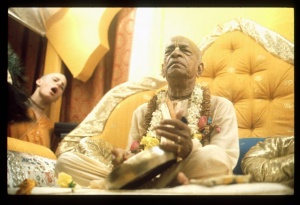CC Madhya 19.27 (1975): Difference between revisions
(Vanibot #0027: CCMirror - Mirror CC's 1996 edition to form a basis for 1975) |
(Vanibot #0020: VersionCompareLinker - added a link to the Version Compare feature) |
||
| Line 2: | Line 2: | ||
<div style="float:left">'''[[Sri Caitanya-caritamrta (1975)|Śrī Caitanya-caritāmṛta (1975)]] - [[CC Madhya (1975)|Madhya-līlā]] - [[CC Madhya 19 (1975)|Chapter 19: Lord Śrī Caitanya Mahāprabhu Instructs Śrīla Rūpa Gosvāmī]]'''</div> | <div style="float:left">'''[[Sri Caitanya-caritamrta (1975)|Śrī Caitanya-caritāmṛta (1975)]] - [[CC Madhya (1975)|Madhya-līlā]] - [[CC Madhya 19 (1975)|Chapter 19: Lord Śrī Caitanya Mahāprabhu Instructs Śrīla Rūpa Gosvāmī]]'''</div> | ||
<div style="float:right">[[File:Go-previous.png|link=CC Madhya 19.26 (1975)|Madhya-līlā 19.26]] '''[[CC Madhya 19.26 (1975)|Madhya-līlā 19.26]] - [[CC Madhya 19.28 (1975)|Madhya-līlā 19.28]]''' [[File:Go-next.png|link=CC Madhya 19.28 (1975)|Madhya-līlā 19.28]]</div> | <div style="float:right">[[File:Go-previous.png|link=CC Madhya 19.26 (1975)|Madhya-līlā 19.26]] '''[[CC Madhya 19.26 (1975)|Madhya-līlā 19.26]] - [[CC Madhya 19.28 (1975)|Madhya-līlā 19.28]]''' [[File:Go-next.png|link=CC Madhya 19.28 (1975)|Madhya-līlā 19.28]]</div> | ||
{{CompareVersions|CC|Madhya 19.27|CC 1975|CC 1996}} | |||
{{RandomImage}} | {{RandomImage}} | ||
==== TEXT 27 ==== | ==== TEXT 27 ==== | ||
<div class="verse"> | <div class="verse"> | ||
:eta | :eta śuni' gauḍeśvara uṭhi' ghare gelā | ||
:palāiba | :palāiba bali' sanātanere bāndhilā | ||
</div> | </div> | ||
| Line 18: | Line 17: | ||
<div class="synonyms"> | <div class="synonyms"> | ||
eta | eta śuni'—hearing this; gauḍa-īśvara—the Nawab of Bengal; uṭhi'-standing up; ghare gelā—went back home; palāiba—I shall run away; bali'-because of this; sanātanere bāndhilā—he arrested Sanātana. | ||
</div> | </div> | ||
| Line 32: | Line 31: | ||
<div class="purport"> | <div class="purport"> | ||
It is said that the relationship between the Nawab of Bengal and Sanātana Gosvāmī was very intimate. The Nawab used to consider Sanātana Gosvāmī his younger brother, and when Sanātana Gosvāmī showed a very strong intention to resign, the Nawab, feeling familial affection, essentially said, | It is said that the relationship between the Nawab of Bengal and Sanātana Gosvāmī was very intimate. The Nawab used to consider Sanātana Gosvāmī his younger brother, and when Sanātana Gosvāmī showed a very strong intention to resign, the Nawab, feeling familial affection, essentially said, "I am your elder brother, but I do not look after the state management. My only business is attacking other states with my soldiers and fighting everywhere as a plunderer. Because I am a meat-eater [yavana], I am used to hunting all kinds of living beings. In this way I am destroying all kinds of living entities in Bengal. While engaged in this destructive business, I am hoping that you will tend to the administration of the state. Since I, your elder brother, am engaged in such a destructive business, you, being my younger brother, should look after the state management. If you do not, how will things continue?" This talk was based on a family relationship, and Sanātana Gosvāmī also replied in an intimate and joking way. Essentially he told the Nawab, "My dear brother, you are the independent ruler of Bengal. You can act in whatever way you like, and if someone commits fault, you can punish him accordingly." In other words, Sanātana Gosvāmī was saying that since the Nawab was accustomed to acting like a plunderer, he should go ahead and take action. Since Sanātana was not showing much enthusiasm in performing his duty, the Nawab should dismiss him from his service. The Nawab could understand the intention of Sanātana Gosvāmī's statement. He therefore left in an angry mood and ordered Sanātana Gosvāmī's arrest. | ||
</div> | </div> | ||
Latest revision as of 12:06, 27 January 2020

A.C. Bhaktivedanta Swami Prabhupada
TEXT 27
- eta śuni' gauḍeśvara uṭhi' ghare gelā
- palāiba bali' sanātanere bāndhilā
SYNONYMS
eta śuni'—hearing this; gauḍa-īśvara—the Nawab of Bengal; uṭhi'-standing up; ghare gelā—went back home; palāiba—I shall run away; bali'-because of this; sanātanere bāndhilā—he arrested Sanātana.
TRANSLATION
Hearing this, the Nawab of Bengal stood up and returned to his home. He ordered the arrest of Sanātana Gosvāmī so that he would not be able to leave.
PURPORT
It is said that the relationship between the Nawab of Bengal and Sanātana Gosvāmī was very intimate. The Nawab used to consider Sanātana Gosvāmī his younger brother, and when Sanātana Gosvāmī showed a very strong intention to resign, the Nawab, feeling familial affection, essentially said, "I am your elder brother, but I do not look after the state management. My only business is attacking other states with my soldiers and fighting everywhere as a plunderer. Because I am a meat-eater [yavana], I am used to hunting all kinds of living beings. In this way I am destroying all kinds of living entities in Bengal. While engaged in this destructive business, I am hoping that you will tend to the administration of the state. Since I, your elder brother, am engaged in such a destructive business, you, being my younger brother, should look after the state management. If you do not, how will things continue?" This talk was based on a family relationship, and Sanātana Gosvāmī also replied in an intimate and joking way. Essentially he told the Nawab, "My dear brother, you are the independent ruler of Bengal. You can act in whatever way you like, and if someone commits fault, you can punish him accordingly." In other words, Sanātana Gosvāmī was saying that since the Nawab was accustomed to acting like a plunderer, he should go ahead and take action. Since Sanātana was not showing much enthusiasm in performing his duty, the Nawab should dismiss him from his service. The Nawab could understand the intention of Sanātana Gosvāmī's statement. He therefore left in an angry mood and ordered Sanātana Gosvāmī's arrest.